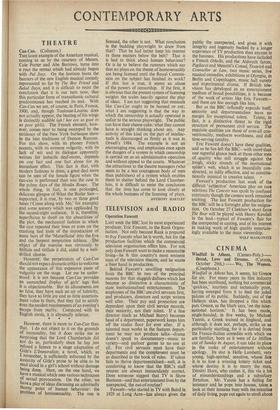TELEVISION and RADIO Operation Fawcett LAST week the BBC lost
its most experienced producer, Eric Fawcett, to the Rank Organ- isation. Not only because Rank is prepared to pay Fawcett what he is worth, but for the production facilities which the commercial television organisation offers him. For not only does Fawcett want to make a reasonable living—he is this country's most eminent man of the television theatre, and he wants a freer hand in production.
Behind Fawcett's unwilling resignation from the BBC lie two of the principal reasons for that sluggish dullness which has become so distinctive a characteristic of state institutionalised entertainment. The ' employees of the BBC are civil servants first, and producers, directors and script writers well after. Their pay and promotion are dependent upon their civil service records, their seniority, not their talent. If a fine director (such as Michael Barry) becomes head of a department, paperwork keeps him off the studio floor for ever after. If a talented man works in the features depart- ment he may not produce talks—drama doesn't speak to documentary—music to variety—and parlour games to no one at all. For civil servants must have their departments and the complement must be as described in the book of rules. If talent fails to thrive departmentalised—well, ,it is comforting to know that the BBC's staff returns are always immaculately correct. Does someone suggest that TV is Show Business—and that entertainment lives by the unexpected, the out-of-routine?
Fawcett—who started in TV with Baird in 1929 at Long Acre—has always given the
public the unexpected, and given it with integrity and ingenuity backed by a longer experience of TV production than anyone in the business. His productions have included a French Othello, and the Aldwych farces, Pagliacci and Menotti's Consul, Tovarich and Counsellor at Law, two music series, five musical comedies, exhibitions at Olympia, in Berlin and Copenhagen, music hall variety and experimental drama. If British tele- vision has deieloped as an entertainment medium of broad possibilities, it is because of the work of artists like Eric Fawcett— and there are few enough like him.
But as the BBC inflatedly expands itself, seniority and departmentalism leave no margin for exceptional talent. Talent, in fact, is a distinctive threat to the rigid structure of permanent civil service. The requisite qualities are those of over-all con- ventionality, mediocre worthiness, and dull time-serving timidity. Eric Fawcett doesn't have these qualities, and so he has left the BBC—with more\ than one regretful glance back at those other men of quality who still struggle against the tough, sticky strands of the institutional spider's web, which is so beautifully con- structed, so tidily effective, and so constitu- tionally inimical to creative talent. • Fawcett's production last week of the difficult 'subjective' American play on race relations The Concert was spoilt by confused continuity though the camera work remained exciting. The last Fawcett production for the BBC will be a fortnight after his resigna- tion. On October 27 Chekhov's short farce The Bear will be played with Henry Kendall in the lead—typical of Fawcett's flair for the unexpected in casting, and of his interest in making work of high quality entertain- ingly available to the mass viewership.
WOLF MANKOWITZ


































 Previous page
Previous page